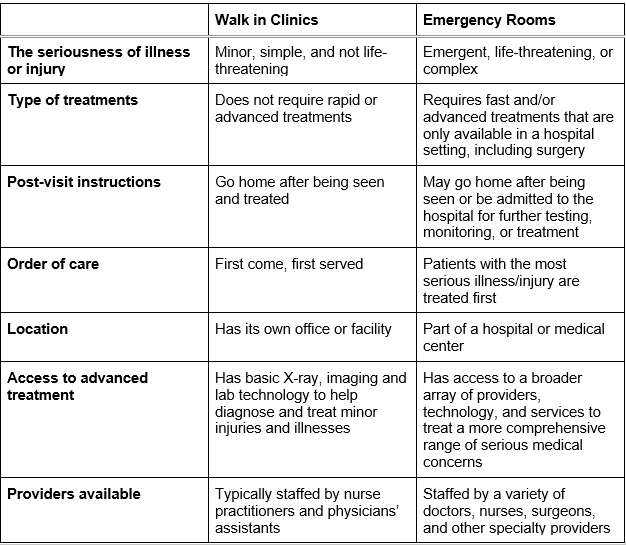Many times, medical concerns can appear out of the blue. Your doctor’s office may be closed or unable to schedule an appointment for you immediately. Deciding which alternative is right for your illness or injury can be confusing, especially because there are various options.
Walk in clinic and emergency room are two of those options. Knowing the difference between the two can get you the care you need faster.
A walk in clinic can be a good option if you’re not feeling well, but it’s not serious, or you have a minor injury. Staffed by nurse practitioners and physician assistants, these clinics treat patients of all ages with fast, convenient care.
When you visit a walk in clinic, care is given on a first-come, first-served basis. This means you don’t need an appointment and can just walk in for care. Some clinics offer online check-ins to make it a smoother process for patients and usually accept most insurances.
Walk in clinics treat medical issues such as:
Some walk in clinics offer additional services, including:
An emergency room (ER), also called an emergency department (ED), is part of a hospital or medical center. Emergency rooms are designed to handle emergent or life-threatening situations, so while you do not need an appointment at an emergency room, patients with the most severe illnesses and injuries are treated first.
You’ll see a doctor immediately if your injury or illness is severe. Otherwise, you may have X-rays or lab work done, or you may have to wait to see a provider.
You should go to an emergency room (or, in some cases, call 911) if you are experiencing any of these or similar symptoms:
There are various similarities and differences between walk in clinics and emergency rooms. Here are a few to be aware of:
Both walk in clinics and emergency rooms:
The primary differences between these two facilities include the following:

Walk in clinics provide more basic medical services for minor illnesses and injuries, whereas emergency rooms handle difficult or life-threatening situations.
It’s crucial to be aware of the differences between these two types of facilities so you can make an informed decision about where to go when you need care.